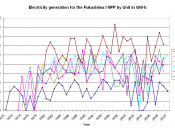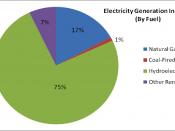INTRODUCTION
The importance of electricity in the world economy can hardly be underestimated. It serves as an input in almost every industry and we, as people have grown more and more dependent on electricity.
The electricity sector was, like most other utilities, traditionally a nationalized sector in many countries across Europe. In many cases a state monopoly was installed to dominate the supply in the whole sector in an effort to realise a 'social' optimum without exercising monopoly power. During the second half of the twentieth century, a trend of deregulation and privatisation was introduced into the energy sector. The coal and coke sectors were the first components to be liberalized in the European Union. Nowadays a restructuring of the electricity sector is gaining pace. This restructuring involves privatisation and deregulation of the sector: the state monopoly is abandoned and market power divided over several private suppliers; or in other words, free market competition is introduced.
The subject of privatisation of electricity markets is an extremely interesting one because it has a significant impact on many aspects of the European societies. As described in the third chapter, the privatisation has a clear impact on employment, environment and prices. Of course the list of affected sectors and aspects is much longer.
The fist chapter of this paper will describe the background of the electricity sector: its structure, the background and several tendencies that have led to the recent change of course.
The second chapter describes the restructuring itself: the process of denationalisation the electricity sector through deregulation. The third chapter, finally, describes the impact of the privatisation after the first steps of its implementation in the EU countries.
CHAPTER 1: the nationalised electricity sector.
1.1 Nationalisation
The energy sector, which consists of the electricity, coal, oil and gas sectors was...


